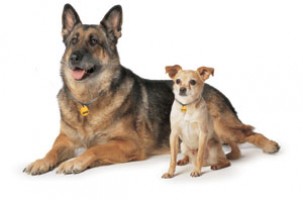Old age is not a disease
How-and when-will I know that my dog is getting “old”?
Checkup time now comes twice a year
Keep your vet informed
Most importantly, you should tell your veterinarian about any noticeable change in your dog’s physical condition or behaviour. A problem that you may assume is simply related to your pet’s advanced age may actually be the result of a treatable medical condition. For example, your dog’s reluctance to exercise may not stem from the normal decrease in energy that comes with age, but from arthritis or a heart condition both of which can be managed with the proper treatment. Regular, semi-annual checkups can thus help your veterinarian work out a suitable preventative health program for your pet and catch any problems sufficiently early to provide effective treatment. Working together, you can both ensure that your dog’s senior years will be healthy and happy ones.
Something to chew on
Put comfort on the menu
You should also ensure that your dog is comfortable while eating. Most pet owners place food dishes and water bowls on the floor, but this may be a source of discomfort for a large or overweight dog, or for one whose arthritis makes it difficult – or even painful – to bend down. Many pet supply outlets have eating tables that are specially designed with cut-outs for food and water containers and available in various heights to suit various sizes of dogs. Or you can fashion your own inexpensive solution to this problem: for example, a plastic crate covered in a towel to absorb spills.
Senior dog food do’s & don’ts
- Since food with high mineral and protein content should be avoided, ask your veterinarian for recommendations about a type that’s right for your dog.
- Do consider, in consultation with your veterinarian, increasing the level of fibre in their diet, especially if they suffer from frequent constipation.
- Don’t feed your dog between-meal snacks or table scraps.
The top 10 health tips for senior dogs
- Take your dog to his or her veterinarian for twice-yearly checkups.
- Become informed about conditions and diseases common to senior dogs, be on the lookout for symptoms and, should they arise, inform your dog’s veterinarian promptly.
- Feed your dog the best food you can afford and consider giving them two small meals a day rather than one large one.
- Don’t overfeed-obesity causes many health problems and may shorten your dog’s life.
- Consider, on your veterinarian’s recommendation, the use of dietary supplements such as glucosamine/chondroitin for arthritis.
- Make sure your dog receives adequate exercise, according to their physical capacities.
- Look after your dog’s dental health. Brush their teeth daily and have them cleaned professionally when your veterinarian so advises.
- Have your veterinarian do a risk assessment to determine an appropriate vaccination protocol for your dog.
- Do your utmost to control ticks and fleas and make sure your dog and their environment (bed, play area, etc.) are always spotlessly clean.
- Give your dog lots of love and attention and do all you can to keep them interested, active, happy and comfortable.

